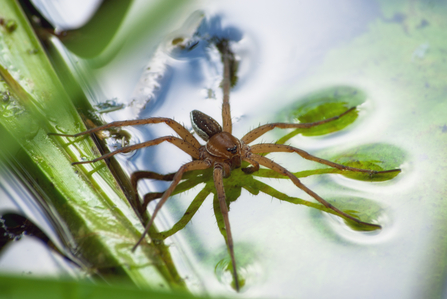
Fen raft spider

Fen raft spider
The warm weather created ideal conditions for the release of the tiny spiders who had been nurtured in bottle nurseries in project leader Dr Helen Smith’s kitchen up until last weekend!
Carlton Marshes which lies on the River Waveney downstream from Redgrave and Lopham Fen and Castle Marshes, is ideal habitat for the spiders and it is hoped that the success of the project will result in the species being less endangered.The work, grant aided by BBC Wildlife Fund, is a Natural England/Suffolk Wildlife Project.
Dolomedes plantarius was not discovered in the UK until 1956 when eminent arachnologist Eric Duffey found it around the margins of peat pools at Redgrave and Lopham Fen, at the source of the River Waveney on the Norfolk/Suffolk border. A second UK population was discovered, 180 km away, when Peter Kirby identified D. plantarius from grazing marsh ditches on the Pevensey Levels in East Sussex in 1988. In 2003, a third UK population was discovered on a disused canal near Swansea, South Wales, by local naturalist Mike Clark. The fen raft spider is one of only two British spiders that if fully protected by law and has been the subject of a Species Recovery Programme since 1999.